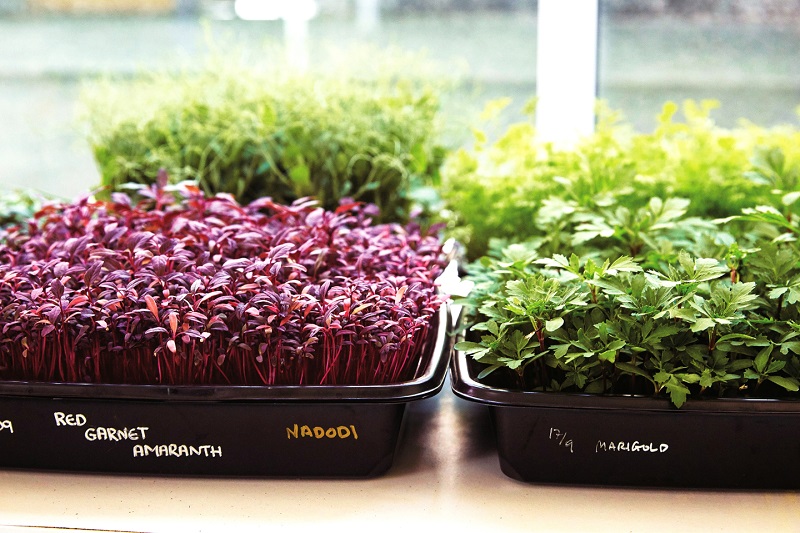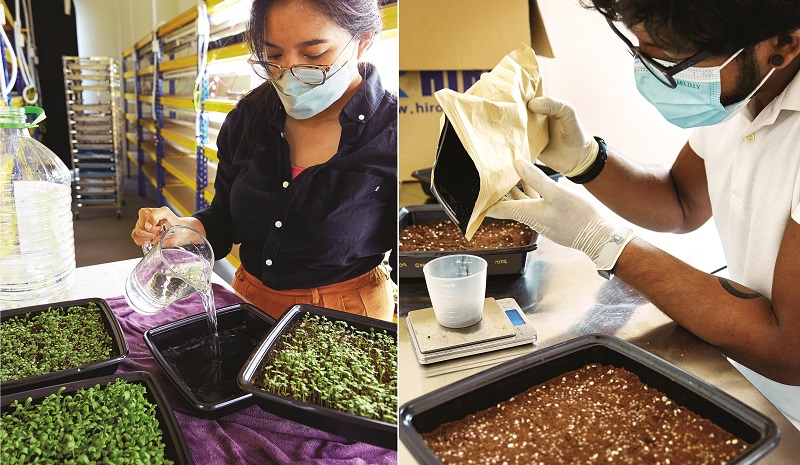
The Babylon team: Eshton Thomas, Stuart Thomas, Joel Tan and Abang Dzulqarnaen (All photos: Soophye)
From a religious standpoint, the word “Babylon” — although derived from the Akkadian word that means “gate of god” — is an evident counterfeit of God’s eternal city, and has transcended its historical significance to become synonymous with sin and pride in Western art and literature.
“As you might imagine, some people were not pleased when I told them the name,” laughs Babylon Vertical Farms co-founder Stuart Thomas. “But I don’t like names that are too on the nose or too obvious. When a friend suggested ‘Babylon’, it really piqued my interest.”
Perhaps he was thinking about the Hanging Gardens of Babylon, the only one of the Seven Wonders of the World whose location has not yet been conclusively established. More important is what it is, for which there are multiple theories — some researchers proposed that these were rooftop gardens, while another theory suggested that the gardens were built within the walls of the royal palace at Babylon, and were actually roof gardens laid out on a series of ziggurat terraces irrigated by pumps from a nearby river. Either way, it points to the idea of a garden established in non-traditional formats, which Thomas was already deeply inspired by as a possible solution to the issue of food security in Malaysia and beyond.
The name Babylon Vertical Farms was assigned to the project he submitted at a start-up incubator organised by the Malaysian Global Innovation and Creativity Centre (MaGIC). When the grant funds were disbursed at the end of the four-month incubator programme back in 2016, Thomas, along with co-founders Abang Dzulqarnaen, Eshton Thomas and Joel Tan, went ahead to establish Babylon as an agricultural company committed to continuously innovating and harnessing new technologies to further their business. An urban vertical farm set-up today based in Kota Damansara, Selangor, Babylon focuses on producing high-quality hydroponic vegetables and herbs without sunlight and soil, with everything grown indoors and as close to the city as possible while using up to 90% less water than traditional farming.
_s1a6013a_1.jpg

The big dream, however, is more than just an urban vegetable source — by continually reinvesting its profits in R&D, Babylon aims to eventually engineer and build low-cost vertical farms in impoverished areas of Southeast Asia to help eliminate food scarcity caused by unfavourable farming and economic conditions.
Vertical farming may seem unfamiliar to many Malaysians because space has never been an issue for us. The practice of producing food on vertically inclined surfaces first became popular in 1999 when Dickson Despommier, professor of public and environmental health at Columbia University, challenged his students to calculate how much food they could grow on the rooftops of New York. Dissatisfied with the results, he and his students proposed a 30-storey vertical farm equipped with artificial lighting, advanced hydroponics and aeroponics that could produce enough food for 50,000 people.
Despommier’s grub-growing skyscraper was never built, but the idea certainly took flight all over the world where land for agriculture was scarce but power supply was constant — crowded, bustling urban centres come to mind, as the primary goal of vertical farming is maximising crop output in a limited space.
We meet Thomas and his team at Babylon’s penthouse-level vertical farm, which admittedly looks nothing like one might expect — banish all romantic notions of lush farmland and sunlight glistening on dewy fresh produce, because vertical farms are designed to be, above all, practical and functional. In a well-lit, air-conditioned room, tall shelves are fitted with multiple trays of vegetables in various stages of growth. A gurgling pump and a sink at the end of the room is where just enough water is measured out for each tray, and the light bulbs on each level of the shelves are checked and adjusted so they operate optimally.
The space is sparse — no on-set yoga studio or hair salon, thank you — but purposeful, while the cemented open-air balcony area just outdoors is where the team is experimenting with edible flowers in plastic tongs. We tried one on Thomas’ encouragement — the cranberry hibiscus has beautiful red leaves that impart a distinctly tart flavour, and its bloom, which we didn’t touch, is a breathtaking deep magenta.
babylon_vertical_farms.jpg

“When we started, we were an urban vertical farm — the primary goal was to grow food and help Malaysia improve its food security. We noticed that in Singapore, which has a smaller land mass and more restrictive use of resources, there is an awareness of the need to look at food shortage before it becomes an issue. They launched the ‘30 by 30’ [goal] in the last two years but in Malaysia, we don’t have anything like that yet,” Thomas says as we settle down on Babylon’s only sofa.
“Food security is not something you want to gamble on, and global projections aren’t great. When we started, we were in our early twenties and we figured that, rather than going the corporate route, doing something like this was what we really wanted. After we applied for the start-up accelerator and got it, we realised there was a huge opportunity to really make a go of things, so we did.”
Launched last year, the “30 by 30” initiative is spearheaded by the Singapore Institute of Food and Biotechnology Innovation to support the country’s efforts to produce 30% of its nutritional needs locally by 2030. There is no equivalent in Malaysia just yet — our needs are also far different from Singapore’s — but there is much to learn from this innovative and forward-thinking programme. Thomas may not have been thinking about being a pioneer or anything of the sort, but Babylon does seem to be an early local adopter in this farming segment.
As a student of accounting, he was keen to see if the vertical business model could run as a cost-effective agricultural model for urban folk to perhaps manage on their own. “Vertical farming can feed a lot of people, there is a huge potential for good here. That’s why we thought it was more than worth the risk, on our part.”
For Thomas, in particular, the alternative — working in his parents’ travel agency — was something he knew he would not be able to stomach. “I spent three weeks working for them before realising I simply wasn’t cut out for that kind of office work,” he laughs. “Going it alone is much harder and this business involves a lot of physical work too, but it makes me much happier.”
Babylon’s business idea eventually attracted the attention of a few angel investors and it opened its first farm in Ampang, Kuala Lumpur. It was able to move to the current facility earlier this year, alongside a smaller set-up in Taman Melawati. “The idea was to grow leafy greens hydroponically and sell directly to restaurants and, later, supermarkets. We now sell our kale to Ben’s Independent Grocer and Village Grocer. Last year, we started growing microgreens and the demand from chefs at high-end restaurants for this was quite great. Our business is more of a B2B thing, we don’t really go directly to customers.”
Although Babylon’s initial game plan was to grow vegetables to scale, it has not been easy because of the effects of the pandemic — the microgreens they sell today are almost entirely bought up by fine-dining restaurants, which is a far cry from the kind of business they initially had in mind.
Thomas agrees wearily. “Last year, our capability to bring in additional investors to fund more farms didn’t pan out, and this year’s MCO (Movement Control Order) was really tough for us. With microgreens, it’s super easy to scale up. The cost to add one rack to this shelf here is about RM1,000, and it can fit about 50 trays of greens — each of which sells for about RM50. From a business perspective, the microgreens pay the bills.”
What has topped up its coffers — from which the team draws its regular, albeit small salaries — is the consultancy service that it runs. A necessary pivot when restaurants shut down last year, it’s now something they hope to develop further. It involves assisting people who intend to set up proper vertical farms of their own, walking them through the tedious process of identifying the space required, the raw materials supply, utility requirements and even how to run a vertical farm. Spoiler alert — it is not as easy as you may think. It requires a minimum investment of RM200,000, at least 1,000 sq ft of space and a healthy risk appetite, along with an understanding of farming.
There are downsides to vertical farming too, as is the case with any new venture, but Thomas and his team are focusing on the positives for now. “Every week, the clientele for our microgreens is increasing, our sales are going up. We just need to make sure we stay on top of quality and that everything our clients get is the absolute best,” he says. “Eventually, we will become the kind of innovative farming company we initially had in mind.”
The seeds have been planted, after all. So now, we wait.
This article first appeared on Oct 11, 2021 in The Edge Malaysia.


